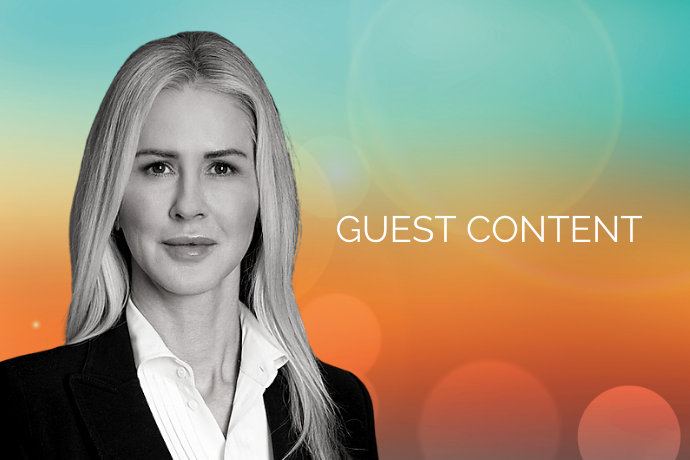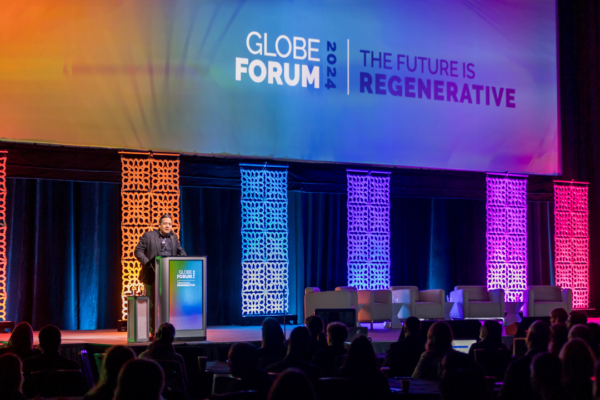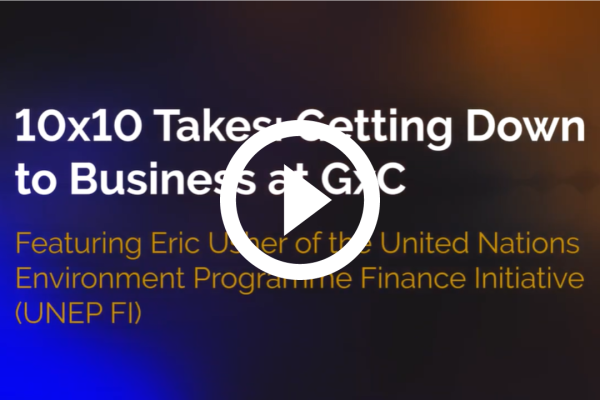GUEST CONTENT
As the impacts of climate change take hold and organizations and governments the world over commit to net-zero emissions by 2050, the world is shining a brighter spotlight on energy than ever before. What kind of system transformation is needed to get to a lower-carbon world? How can we ensure that new energy systems are just and equitable? How do we bridge the gap between net-zero targets and the actions needed to achieve them?
In the midst of this global conversation, Susannah Pierce boldly stepped into the role of President & Country Chair, and GM Renewables and Energy Solutions for Shell Canada. Susannah has over two decades of experience in the energy sector and previously served as Director of Corporate Affairs for the LNG Canada project. GLOBE Series Managing Director, Elizabeth Shirt, met with Susannah to learn more about her vision for Shell Canada.
Click on the play button below to watch the video or scroll down for the interview transcript.
Elizabeth Shirt: Good morning and good afternoon from the territory of the Tsleil-Waututh First Nation, where I have the privilege of making my home office—a beautiful part of what is also known as North Vancouver. Thank you so much for joining us today.
The race to net zero is on. Canada has tabled legislation to join governments and companies around the world in committing to a goal of carbon neutrality by 2050. The record heat here in B.C. and across Canada is a reminder that the climate crisis isn’t far off or intangible. It’s real, it’s urgent and it’s happening now. At the same time, we know that more than half of Canada’s current emissions are produced by oil, gas, and transportation, meaning there is no way we can achieve this ambitious target without energy system transformation.
As the new President and Country Chair of Shell Canada, Susannah Pierce works at the heart of this transformation. She joins me today to discuss what a net-zero future means for Shell. Welcome Susannah and thanks for joining me.
Susannah Pierce: It’s wonderful to be here. Thank you for having me. I’m actually calling in myself from the traditional territory of the Musqueam, Tsleil-Waututh, and Squamish Nations, which is here in Vancouver. It’s so wonderful to be next door!
ES: Fantastic. We’re just down the road from one another. Susannah, first of all, I really want to congratulate you on becoming the new President and Country Chair of Shell Canada. And I wanted to start by just asking if you could share your vision for this position and talk a little bit about your first priorities in the role.
SP: It was a privilege to be considered to do this job because it is such a pivotal time for the energy sector. If I had to choose a company to be in a leadership position with, it would be Shell, because I think Shell is genuinely trying to tackle this challenge as one of the major energy companies in the world. I think it has the wherewithal to make significant changes.
I’ve asked myself a number of times: do I want to be outside trying to influence change, or do I want to be inside trying to influence change? Being inside influencing change, I think, is where we can have the greater impact. I’ve seen it just in the first couple of months that I’ve been on scene through the level of activity trying to transition our company from one that had traditionally produced oil and gas into one which is a leader in new technologies and new energy systems that can achieve our net-zero ambitions.
My vision really is to help with that transition, to accelerate it as much as I can, and also to enable the company to have a renewed relationship with communities, with Indigenous communities, and with partners, because partners are critical to the delivery of the transition. Finally, the other piece that I think sometimes gets lost as we talk about how to get to net zero—it’s customers. When we consider Shell’s own footprint in Scope 1, 2 and 3, most of the emissions are at the end user or consumer level. So, we will not be able to get to net zero and we will not be able to get to the Paris Agreement goals without customers coming along with us. So, that’s got to be a critical focus of mine as well.
ES: Awesome. That customer piece is so important to get us where we need to go. Susannah, Royal Dutch Shell recently announced it will accelerate emissions reduction plans in response to a court order in the Netherlands. How is this going to affect Canadian operations? How are you going to ensure that your plans are ambitious enough to respond?
SP: It’s a great question, because the decision that came out of the District Court in The Hague was a bit of a surprise in that we were surprised that one company would be targeted to achieve and accelerate its transition to net zero, because, as I just said, it takes more than one company. It takes an entire ecosystem to achieve our climate ambitions. So, we were surprised by the decision, which was to accelerate our transition to net zero and reduce our emissions by 45% by 2030. It’s ambitious.
Our reaction to that was to ask: “What more can we do?” It renews our effort. I think it increases our ambition to do more and to work with others to do more, including our customers, governments, and all the stakeholders and partners that can help us. That decision helped us realize that we cannot do this alone and we’ve got to work together with all those parties. As I said at the beginning, I think the other key thing is bringing society with us—helping people realize the benefits of the energy system we’re creating, which speaks to the relationships we have with communities and governments as well.
ES: Absolutely, a challenge on a global scale. Susannah, to reach net-zero emissions by 2050 at the global level, we’ve heard the latest International Energy Agency (IEA) report recommending no new oil and gas developments. You already talked about development having been at the heart of Shell’s history, and it is a part of the current business model. You’ve made this tremendous 2050 commitment. How do you reconcile that IEA report with your climate targets? What can Canadian consumers expect from Shell in the next three decades?
SP: The IEA report, just like Shell scenarios, is a pathway to net zero. Just like any pathway or scenario, you’ll have different inputs and different variables, which will lead to a particular outcome. So, the IEA report has various variables and inputs to lead to that specific outcome, as does Shell’s own strategy, which actually already includes the fact that we are transitioning from oil and gas. We reached peak oil in 2019 and we will see no new frontier exploration by 2025. I just want to make a comment on that one too, because new frontier exploration does not mean that we continue to produce from perhaps even more carbon-intensive barrels. It allows us to get the best barrels. It allows us to find the lowest-carbon and the most-productive barrels. As we’ve already made these commitments, of course, we’re going to continue to look at how we’re progressing against our overall net-zero commitment as we move forward. But there’s a lot of consistency there, and as I said, if you look at what goes in and what comes out, you can see that there are multiple pathways to net zero. The IEA produced one and we have one as well.
ES: So, exciting times, Susannah, because you’re not alone in making a net-zero commitment. Many major corporations are doing the same, but don’t necessarily have clear plans in place to achieve them. Is this greenwashing in your mind? Should companies lead with that ambition or strategy and plans? What comes first?
SP: I would be hesitant to say that you should put a goal out there, if you have absolutely no intention or plan for getting there, especially because I’ve always been a bit of a proponent of setting targets and making them public simply because then you’re held accountable publicly. So, I support that.
I think the other thing which Shell has done is that it was the first energy company to say that it’s actually going to go for a shareholder vote for its energy transition strategy, and then be held accountable for that transition strategy and progress every year and provide an update to shareholders every three years. So, you can see that we are not only setting a goal, we’re setting the milestones to be held accountable.
Other companies will have other plans and other methods of achieving their net-zero commitments. I think it’s up to each one of us—investors, communities, what have you—to comment on them, to look at them, and to hold those companies accountable. But what I have seen, which I think speaks to the fact that we are in a new space in terms of collaboration, is joint partnerships in achieving a net-zero commitment. So, you’ll see companies like ours partner with Rolls-Royce to create sustainable aviation fuels, or with Amazon to provide renewable power, because we also share climate ambitions and goals. You’ll see us partnering with Microsoft, similarly, to try and jointly achieve our climate goals.
So, I think greenwashing is going to be determined by how successful each company is in achieving the goals they set forth. The jury can still be out, but from the Shell perspective, what we have done is set those times for those juries to take a look at how we’re doing, and I think that’s an even better process for addressing the concern of greenwashing.
ES: Fantastic, thanks, Susannah. You said that it takes collaboration and partnerships. We’ve talked about how this transformation is going to affect all segments of the economy. As we make that transition, how do we ensure that workers have access to the reskilling and upskilling programs that they’re going to need to continue to be part of the clean economy? How do we make sure that no one’s left behind?
SP: It’s a fantastic question because we can’t ignore the fact that this will have an impact on real jobs, on real people, and on families. I mean, just witness the stress that has happened to families over COVID-19—various sectors where you can’t go to work and you don’t know where you’re going to get money to feed your kids, to pay for clothes, or to do the things you used to do. There’s going to be some real dislocations if we are not on our front foot.
I was pleased to see that in this year’s federal budget there were some funds allocated for the transition. I think that’s going to be critical, because the types of skills that you have today—refinery, for example—while they might be applicable to a certain extent, you’re still going to have to have some new skills and development, particularly as you look at the digital transformation that’s also happening along with the energy transformation. For me, I think it’s looking forward saying, “What are those jobs of the future?” Because the number of jobs that we have right now—at the gas plant, for example—are not the same number of jobs we’re going to have at a solar facility or wind farm. What are the skills we need for the different types of jobs that we will need? How do we create that roadmap or blueprint? Not only just serving ourselves, but in partnership with communities and Indigenous communities that have already been benefiting from these operations in their territories, as well as in partnership with academic institutions, universities, and governments. We have to all see the same roadmap to an extent, to really be successful in it, so that we can also help influence the kids that are coming behind us, because training kids today for jobs that won’t be here when they get out of school doesn’t make any sense. So, I’m a big proponent of looking forward and working in a collaborative fashion with all of those involved, so that we can create the right sort of blueprint for those future jobs.
ES: Let’s pull the thread a little further, Susannah, because in this transition, we also have opportunities to include groups that historically have not necessarily been part of the energy sector. I’m thinking of women and people of colour. How is Shell looking at that opportunity?
SP: From the gender point of view, indeed we’ve made a very deliberate effort to increase the number of women in leadership positions. I’m probably a product of that myself. I also have a very keen eye on what we’re doing to ensure there’s equity within our leadership positions. But then, also as it relates to BIPOCs (Black and Indigenous People of Colour), let’s really make sure that our baseline—where we are today—is transparent, so we know where we need to get to. Because my ambition is that our company represents a society in which we operate. That’s across the board—inside and outside the house. How are we working with our suppliers? How are we working to develop businesses and communities where we operate so they can benefit from the work that we’re doing? Granted, I’m still just a couple of months in but, looking at another roadmap towards where we want to be, it has to start with data—where we are and collecting that, and then establishing a plan, working with businesses in Canada to get there. So, we’ve got a lot more work to do, but I’m happy that we’ve seen some progress and a commitment to get there. Over the last 18 months, we’ve seen multiple transitions. We’ve seen new transparency in a way we never have. Society is also having influence inside the corporation on how we address some of these issues. I want to be right at the centre of that.
ES: Susannah, we’ve reached the fun part of the interview—the rapid-fire round. Are you ready?
SP: I think so.
ES: Give us the first answer that comes to mind. What book is on your nightstand?
SP: Okay, so I have a couple. The first one is Mark Carney’s Value(s): Building a Better World for All. I’ve started it. It’s a good thick book, but Mark Carney is obviously a thought leader and a very respected individual. I’m glad to see his book written and published. I believe in the fact that we need to re-evaluate values. So, I think it’s a very important book to read. I’ve actually shared it with a number of folks on my team.
The other one is a book by Bob Roth about transcendental meditation. I’ve been doing transcendental meditation for some time now. It’s another way of allowing me personally to see the world differently, and in a place of calm and peace. So, that’s another book I have on my bedside table.
I have one more, and that is by Kate Baer and it’s a book of poetry. It’s called What Kind of Woman. It’s an awesome book, especially for mothers. I’m a single mom and it’s a good book for us to feel empowered and then also to empower our daughters. I highly recommend that one too.
ES: Another way to understand what motivates you: what is your favorite motivational quote?
SP: I have a bunch, but Eleanor Roosevelt said, “You must do the things you think you cannot do.” I apply it to my life. I apply it to my kids’ life. I think we can apply it to the companies in which we work as well.
ES: Love it. Susannah, what’s the proudest accomplishment of your career?
SP: The proudest accomplishment of my career is actually the decision I made about nine years ago to leave a job to come back to Canada for my two kids. I was a single mom over in The Hague doing this big job, and I realized that I couldn’t be a good mom and a good worker unless I had the right balance. So, I made the decision to come back to Canada. That was my proudest moment, I think, partly because I had to come to terms with my own professional ambition and the needs of my family, and I made the right choice.
ES: Amazing. Okay tough one: describe the future of energy in one word.
SP: Inclusive.
ES: Awesome. On that note, Susannah, thank you so much for joining us. It’s been such a pleasure. Love what we’ve heard in terms of what it takes to reach that net-zero target. We need ambition. We need action. We need accountability. And more than anything, we got to work together. It takes a village. It takes collaboration. I’m so excited to see where this journey takes Shell and the next steps with you at the helm here in Canada. Thanks again for joining me today.
For more on the race to net zero, including our Destination Net Zero Events, you can check out www.globeseries.com. Our first event is the Energy and Transportation Days, held Sept. 28 and 29 of this year. We hope to see you there. Susannah, thanks again, and thanks to all of you for attending.




